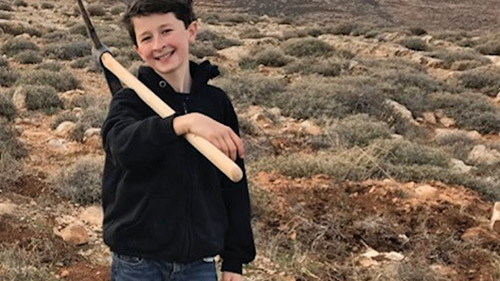
At his recent bar mitzvah celebration, Lavi Gimpel’s great-grandmother handed him a check that she said was “enough for seven trees.”
“One for each member of your family. When I come to the farm someday, I want you to show each tree to me,” said the great-grandmother, Chaya Wexler.
Trees are not a typical bar mitzvah gift. But Lavi Gimpel is not a typical bar mitzvah boy. Not only did he ask his guests—and a bunch of crowd-funders, too—to help him populate the farm his family is establishing in the Judean Hills with trees, but he also chose to have his Feb. 19 bar mitzvah party at a soup kitchen in downtown Jerusalem.
“The place is awesome,” Lavi said regarding the Hineni Jerusalem soup kitchen. “They’re feeding poor people. I love supporting what they’re doing there.”
In fact, among the topics Lavi studied leading up to the bar mitzvah with his father, Rabbi Jeremy Gimpel, were the Jewish laws governing agriculture in Israel and tzedaka (charity).
Hineni Jerusalem, a mostly volunteer-run “humanitarian restaurant” (a term manager Benjamin Philip prefers over “soup kitchen”) serves lunch to some 250 people Sunday through Thursday. It’s a feat made possible by donors from near and far as well as the diners who are able to pay—often far more than the suggested 18-shekel (about $5) donation. Now, for the first time, a family like the Gimpels has hosted a major Jewish lifecycle event there.
For the American-born Rabbi Jeremy Gimpel with his wife, Tehila, who live in the Neve Daniel settlement in the Gush Etzion region, the fact that the oldest of their five children opted to emphasize the “mitzvah” over the “bar” doesn’t come as much of a surprise.
“We’re raising our children in the spirit of the land of Israel, without TV commercials,” Rabbi Gimpel told JNS.org. “We want them to know and appreciate what a gift this land is.”
Their love of—and commitment to—the land of Israel is why the Gimpels, along with three other families, are establishing the farm in Gush Etzion’s Judean Hills. Their projected move-in date was Hanukkah 2017. The rabbi said he envisions the farm as “a center where people can come to experience the land of Israel in a holistic and organic way through the Hebrew Bible.” That includes growing the seven species that the Torah teaches are indigenous to the land of Israel, and holding seminars on everything from Jewish learning and tradition to Jewish prayer and parenting.
Bar mitzvah boy Lavi’s choices also didn’t shock his aunt, Avigail Gimpel.
“He’s a smart kid with a firm belief system, and he knew he wanted something simple and something that helped others,” she said.
Indeed, bar/bat mitzvahs provide youngsters with the opportunity to explore and strengthen their emerging values, and to make choices that reflect those values.
“At a bar mitzvah, you see them and their values beginning to mature. It’s a time of saying goodbye to the boy and welcoming the young man,” said Rabbi Gimpel, a teacher as well as the co-founder of thelandofisrael.com, an English-language broadcast network based in Jerusalem.
One way that Lavi expressed his values was through a crowd-funding campaign on the Indiegogo online platform. Asking $20 for one tree all the way up to $500 for an orchard of 25 trees, he has so far raised $11,000 toward his $20,000 goal, and has gotten 25,000 hits on a YouTube video for which he wrote the script himself.
“I believe we need to see it as a transitional time, a bar mitzvah season,” Rabbi Gimpel said.
Along Lavi’s journey to the Jewish rite of passage, the father-son tandem enjoyed the highlight of receiving tickets for and jointly attending President Donald Trump’s inauguration in January.
“It was an experience that fused [Lavi’s] passion for international politics with our values of being involved in events that will impact Israel, along with the entire world,” the father said.
When her son read the Ten Commandments from his Torah portion, Yitro, it struck Tehila Gimpel, who practices and teaches law, that there is a message in the commandments for parents and children alike.
“Even though we received them together as an entire people, the 10 commandments are actually worded in the singular,” she said. “God is talking to each one of us as an individual, and giving each of us a path to find Him. Lavi had to have the kind of bar mitzvah that was meaningful for him.”
“Something has changed about him in the days since his bar mitzvah,” added the mother. “His posture has changed. He stands more like a man.”
But does Lavi himself believe he has changed?
“Maybe a little,” he acknowledged. “I guess I do feel a little different. But it’s too soon to know exactly how. I guess one thing I learned is that, even though it’s hard to be a Jew—all the mitzvahs and stuff you have to do—it’s also cool because the mitzvahs are awesome…they’re not easy, but they’re good.”
By Deborah Fineblum/JNS.orgBy Deborah Fineblum/JNS.org









